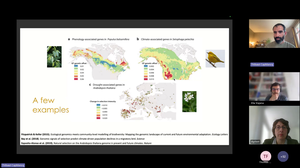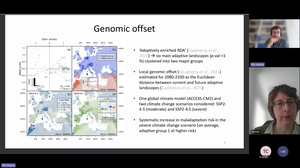Genomic insights: predicting species vulnerability to climate change

The fourth edition of the FORGENIUS Public Webinars hosted on 7 May 2024 highlighted groundbreaking research in predicting species vulnerability to climate change using genomic insights. Dr. Thibaut Capblancq presented their work on the genomic offset metric, a tool that measures the genetic differences between a population's current genetic makeup and what would be optimal for future climates. This metric serves as a critical predictor of a population's risk of maladaptation due to climate change. Dr. Elia Vajana provided a valuable real-life example from a recent study that analyzed 54 indigenous sheep breeds from Europe, North Africa, and the Middle East using advanced genetic techniques.
Dr. Capblancq's presentation delved into the genomic offset metric, emphasizing its utility in predicting climate change impacts on plant populations. The genomic offset metric measures the genetic difference between a population's current state and the optimal genetic makeup required for future climatic conditions. This tool helps identify populations most at risk of maladaptation, thereby informing conservation efforts such as assisted migration.
The calculation of the genomic offset metric involves models that analyze the relationship between genetic variation and environmental factors like temperature. These models predict the genetic composition needed for future climates. Despite its benefits, the genomic offset metric faces challenges. It assumes current populations are optimally adapted, which may not always be accurate, and models might not fully capture complex gene-environment relationships. Additionally, there is a lack of standardized units for comparing results across studies, and predictions do not account for a population's actual future adaptive response.

Dr. Vajana applied the genomic offset metric to study climate adaptation in sheep populations. Sheep have migrated and adapted to diverse environments, resulting in over 1,400 distinct breeds. By analyzing genetic data from over 1,600 sheep representing various European populations, researchers uncovered complex population structures influenced by admixture and human breeding practices.
Linking genetic variations with environmental factors, the study identified 62 candidate genes potentially involved in climate adaptation, associated with functions such as immune response, water retention, and energy metabolism. The research revealed two major adaptive groups: one in continental/northern Europe and another in southern Europe/North Africa/Iran. Using climate models, researchers predicted future climates and estimated the genomic offset for different regions, identifying southern/southwestern Europe as a potential maladaptation hotspot under severe climate change scenarios.
Both presentations underscored the genomic offset metric's importance in assessing climate change impacts on populations.
Future research directions emphasized by both speakers include refining offset estimates with data from unsampled environments and establishing genetic exchange networks to aid adaptation in vulnerable populations. These insights pave the way for more informed conservation strategies, aiming to enhance species resilience against the looming threat of climate change.
Follow the project on social media at @FORGENIUS_EU and subscribe to the newsletter!
Watch the webinar recording!